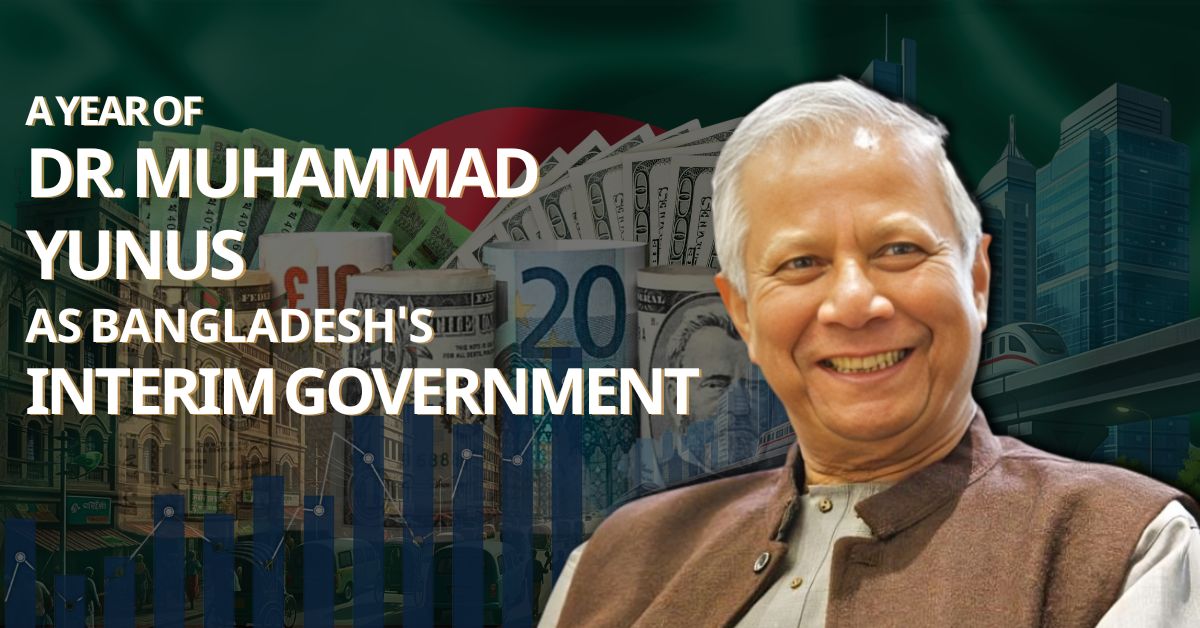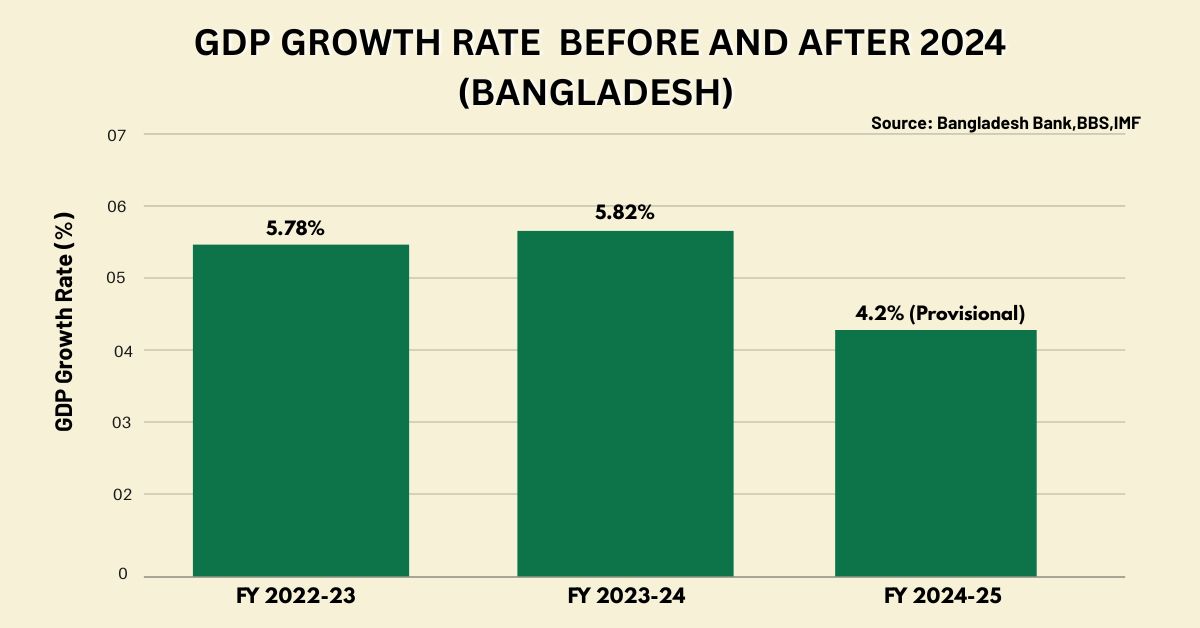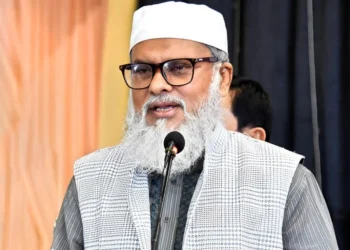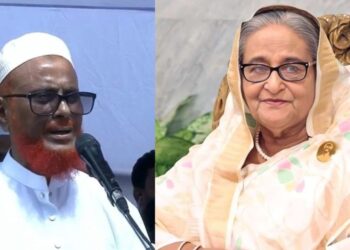1.Introduction
Dr. Muhammad Yunus took over as the head of Bangladesh’s interim government on August 8, 2024. This happened right after a huge public uprising that forced the previous Prime Minister, Sheikh Hasina, to resign and leave the country.
His rise came after weeks of widespread political unrest, known as the July 2024 Movement—a nationwide uprising driven by students and young people. The protests initially began at public universities in response to a controversial quota system. The involvement of private university students was a crucial turning point that helped the movement gain massive momentum and spread nationwide. Young protesters demanded fair governance, an end to corruption, and a fresh start for the nation, fueled by a feeling that traditional political leaders had failed to meet the people’s needs.
Public pressure grew strong, and the movement gained support from civil society, professionals, and ordinary citizens. Roads were blocked, campuses were full of peaceful protests, and social media exploded with calls for change. In this moment of national crisis, people began looking for a leader who stood outside the regular political system, someone trusted, respected, and globally recognized.
Dr. Yunus’s first year from 8 August 2024 to 8 August 2025, and carefully examine what changes he actually brought to Bangladesh’s economy. By looking at real indicators, like GDP growth, per capita income, inflation, remittances, foreign investment, foreign reserves, industrial growth, and corruption rankings, we can understand how effective his leadership has been. We also compare the situation before and after he took office to see if his actions matched public expectations.
2.Dr. Muhammad Yunus as A Bangladesh’s Interim Government
Bangladesh faced a time of deep political unrest. People across the country especially students and young people were frustrated with rising corruption, poor economic conditions, and political instability. This frustration led to the July 2024 Movement, which initially began with protests by students at public universities against the quota system. The movement gained massive momentum and spread nationwide when thousands of students, particularly from private universities, joined in, demanding real change in leadership.
2.1.The July 2024 Uprising
July 2024, Bangladesh witnessed one of the most powerful youth-led movements in its history. Frustrated by years of political instability, corruption, rising costs of living, and lack of accountability, students, civil society, and the general public came together in protest. Roads across Dhaka and other major cities filled with placards, slogans, and voices demanding change.
The movement started with university students protesting against a government rule called a “quota system.” This system reserved a large percentage of government jobs for certain groups, like the families of independence war heroes. The students felt this was unfair and that jobs should be given based on merit (who is most qualified), not connections.
The first protests began at public universities, with students peacefully demanding reform. The government’s response was very harsh. Police and government-affiliated groups used extreme violence, which led to many student deaths and injuries. This brutal crackdown didn’t stop the movement; it made the public incredibly angry and united against the government. After that every single person lost hopes but a turning point came when students from private universities, who are often from more privileged backgrounds, also joined the protests. This showed that the discontent was widespread and not just limited to one group.
The protests grew far beyond the original job quota issue. People were fed up with years of alleged corruption, a lack of democracy, high inflation (the cost of living), and human rights abuses. The protests became a huge public uprising demanding the resignation of the Prime Minister. The public pressure was so overwhelming that the ex Prime Minister, Sheikh Hasina, resigned and fled the country on August 5, 2024. This marked the end of her 15-year rule and created a power vacuum.
2.2.Why Dr. Muhammad Yunus was Chosen
After her resignation, Chief of Army Staff General Waker-uz-Zaman and President Mohammed Shahabuddin announced that an interim government would be formed. The President then spoke with political leaders from across the country and officially dissolved the parliament on 6 August 2024.
The Anti-Discrimination Students Movement, which was the main group behind the uprising, suggested that Dr. Muhammad Yunus, a well-known economist and Nobel Prize winner living in Paris at the time, should lead the interim government. Dr. Yunus agreed, and the interim government was finalized on 7 August 2024. After that, on August 8, 2024, Dr. Muhammad Yunus was officially chosen as the Chief Adviser to lead Bangladesh’s interim government.
3.Economic Conditions before August 2024
Before August 2024, Bangladesh’s economy was facing a mix of challenges and some positive trends, but if we see the overall situation was one of growing public frustration. Sheikh Hasina was marked by a complex and often contradictory set of conditions. While the country showed impressive growth numbers, significant underlying issues grew, leading to public discontent that eventually exploded in the July 2024 uprising.
3.1.Inflation and Price Stability
From 2022 to July 2024, Bangladesh’s economy was primarily defined by a severe and persistent struggle with high inflation. This issue, more than any other, directly impacted the daily lives of citizens and became a major source of public frustration.
•2022: The Onset of High Inflation
The year 2022 marked the beginning of a sharp rise in prices, a trend that would continue for the next two years. The year when inflation started to become a serious problem. The inflation rate, as measured by the Consumer Price Index (CPI), was around 7.7% on average for the year. This was a significant increase from previous years and was mainly driven by global events, especially the Russia-Ukraine conflict, which caused global commodity and fuel prices to rise. A weakening Bangladeshi Taka (the local currency) against the US dollar also made imports more expensive, further fueling inflation.
The Producer Price Index (PPI) shows how much it costs businesses to make goods. In 2022, this started going up. It was an early warning that companies were spending more to produce things and later, they would charge customers higher prices to cover these costs.
•2023: Inflation Gets Worse
In 2023, the inflation problem became much more serious. The average inflation rate (CPI) was around 9.5% for the whole year. Almost every month, inflation stayed at or above 9%, mostly because food prices kept going up. Consumer Price Index (CPI), prices of basic items like food, rent, and electricity increased a lot often hitting double-digit rates. This made life very hard for low- and middle-income people. Even though Bangladesh Bank tried to fix it by raising interest rates, it didn’t help much. PPI costs stayed high, showing that this wasn’t just a short-term problem. High production costs became a long-lasting issue.
•January to July 2024: People Had Enough
In the first 7 months of 2024, inflation got even more worse than last years. This pushed many people over the edge and led to the big protests in July. In July 2024, inflation hit 11.66%, the highest in 12 years. Food inflation was even worse and goes to 14.1%. People’s daily wages couldn’t keep up, and many families couldn’t afford basic meals. PPI were still struggling with high production costs, meaning prices were unlikely to drop soon. Many people blamed the government for failing to control prices, and this became a key reason behind the student-led protest movement in July 2024.
3.2.FDI and Global Confidence
Foreign Direct Investment (FDI) is when a company or person from another country invests money in a business in Bangladesh. This can be by building a new factory, buying a company, or expanding an existing business. The amount of FDI a country gets is a good way to measure global confidence in its economy. From 2022 to July 2024, Bangladesh saw a clear and worrying trend, a steady decline in FDI, which showed that foreign investors were losing confidence.
•2022: The Start of the Decline
In 2022, Bangladesh’s FDI was around $1.60 billion. While this was a decent amount, it was less than the previous years. The decline started because of several new problems. The global economy was unstable due to events like the Russia-Ukraine conflict, and more importantly, Bangladesh was starting to face its own internal issues. A major problem was the growing “dollar crisis” where the country was running low on US dollars. This made it difficult for foreign companies to get their money out of the country when they needed to, which made them hesitant to invest more.
•2023: The Decline Worsens
The situation got worse in 2023. FDI fell to about $1.48 billion, a drop of more than 7% from 2022. Several factors contributed to this. The country was preparing for a general election, and with it came political uncertainty. Foreign investors typically prefer stable environments and will often wait to see what happens before making big commitments. At the same time, the dollar crisis became more severe, making it even harder for foreign companies to do business. A poor ranking on global corruption reports also hurt the country’s image and made it seem like a risky place to invest.
•January – July 2024: A Low Point
The first half of 2024, the decline in FDI became even more pronounced. This period was marked by extreme political unrest, protests, and an unstable economy. There were many economic problems at that time, like the ongoing dollar crisis, high inflation, and a weak banking system. These issues made investors lose trust. Many companies were worried they wouldn’t be able to send their profits back to their own countries. Due to this fear and the unstable economy, foreign direct investment (FDI) dropped to one of the lowest levels in recent years.
3.3.Corruption Ranking
The Corruption Perception Index (CPI), published by Transparency International, is a global report that scores and ranks countries based on how corrupt their public sector is perceived to be. The scale goes from 0 (highly corrupt) to 100 (very clean). A lower score and a lower rank (further down the list of 180 countries) mean that a country is seen as having a more serious corruption problem.
From 2022 to July 2024, Bangladesh’s corruption ranking showed a clear and worsening trend, signaling a severe problem that contributed to the public’s widespread frustration. The country consistently ranked poorly, with its score declining each year.
•2022: The Situation Got Worse than previous
In 2022, Bangladesh scored 25 out of 100. This showed that corruption was still a big problem. Even though the score didn’t change much from before, people believed the government was not doing enough to stop corruption. Corruption in government projects and public services was still a major concern.
•2023: The Decline Begins
In 2023, Bangladesh’s score fell to 24. This was the lowest score in 12 years. It showed that corruption was getting worse. People started to feel that the government had no strong plan or will to fight corruption.
•January–July 2024: The Worst Score and Rising Public Anger
In the first half of 2024, the corruption situation hit a new low. Bangladesh’s score in the 2024 report was 23, the worst in 13 years. This made people even more upset. They felt corruption was making other problems worse, like high prices and waste of public money. Many believed that a few powerful people were taking all the benefits, while ordinary people were suffering.
This public anger was one of the main reasons for the big protests in July 2024. People had lost trust in the government because of this growing corruption.
3.4.Remittance Growth & Forex Reserves
From 2022 to July 2024, Bangladesh faced a serious problem. While the money sent by workers abroad (remittance) remained strong, the country’s dollar savings (foreign exchange reserves) kept going down. This mismatch became a big economic issue and made people very upset.
•2022: Remittance Strong, Reserves Start Falling
In 2022, remittance inflows (the money sent home by Bangladeshis working abroad) were still strong, but they began to slow down. One of the main reasons for this was a growing gap between the official and unofficial exchange rates for the US dollar. But a new problem started, they began using unofficial ways like “hundi” because it gave them better rates than the banks. This reduced the flow of dollars through legal banking channels.
On the other hand, foreign exchange reserves (the country’s savings in foreign money, mostly US dollars) started to fall. They dropped from $40 billion in 2021 to about $33 billion by the end of 2022. This happened because of Bangladesh was importing more than it was exporting and the prices of imported goods were rising due to global issues.
•2023: The Crisis Deepens
In 2023, remittance was still coming in, but it wasn’t enough to stop the crisis. By the end of 2023, reserves had dropped to around $22 billion. The government’s efforts to control the fall were not very effective.
The dollar crisis became a central issue in the economy. The shortage of US dollars made it difficult for businesses to pay for necessary imports, and the Bangladeshi Taka lost a lot of its value. This made imports more expensive, which added to the problem of high inflation that was already a huge burden on the public.
•January – July 2024: A Low Point
By the first half of 2024, the situation was even worse. Remittance inflows, forex reserves fell to a low of around $20 billion by July. This was a critical level, as it wasn’t enough to cover even a few months of import bills. The government’s inability to stop the bleeding of foreign currency was seen by many as a sign of economic mismanagement.
3.5.GDP Growth and Per Capita Income
From 2022 to July 2024, Bangladesh’s economy was defined by a strong growth trend that began to slow with an increase in average income per person. The economy remained primarily by its services and industrial sectors. GDP growth measures the rate at which the economy is expanding, while per capita income shows the average income for each person.
•2022: The economy grew strongly with a GDP growth rate of 7.1%. People were earning more on average, with per capita income (average income per person) at about $2,716.
•2023: Growth slowed down to about 5.8%. This happened because prices were rising (inflation), the global economy was not doing well, and there was a shortage of dollars in the country. The value of the Taka dropped, and as a result, per capita income also fell to around $2,551.
•2024 (January–July): The economy kept slowing, with growth at about 5.4%. Life became more expensive, and many people felt they weren’t getting the benefits of the economy.
•Main Sectors of the Economy
- Services Sector: This is the biggest part of Bangladesh’s economy. It includes banking, transport, trade, education, and healthcare. It made up more than 50% of the total economy.
- Industrial Sector: This sector contributed about 38% to the economy. It was the main driver of growth. The garment industry (RMG) was the most important part, as it brought in a lot of money from exports.
- Agriculture Sector: Though this was the smallest sector, giving about 11% to the economy, it was still very important because it gave jobs to many people, especially in villages.
| Category | 2022 | 2023 | Jan–July 2024 |
|---|---|---|---|
| Inflation (CPI, avg.) | 7.7% | 9.5% | 11.66% |
| FDI (USD) | $1.60 billion | $1.48 billion | $1.27 billion |
| Corruption Score (TI CPI) | 25 | 24 | 23 |
| Forex Reserves (USD) | $33 billion | $22 billion | $20 billion |
| Remittance | $21.03 billion (FY 2021-22) |
$21.61 billion
(FY 2022-23) |
$23.91 billion (FY 2023-24) |
| GDP Growth Rate | 7.1% | 5.8% | 5.4% |
| Per Capita Income (USD) | $2,716 | $2,551 | $2,675 (FY 2023-24) |
Table: Economic Conditions Before August 2024
4.Analysis of Economic Indicators Post-August 2024
Since the interim government took charge in August 2024, Bangladesh’s economy has been on a slow, but noticeable, path to recovery. Interim government prioritized bringing high inflation and a dollar crisis, and its main focus has been on stabilizing the economy and restoring public trust. When the government took power in August 2024, inflation was at a 12-year high, but a combination of policy changes and a more stable economy has helped to bring it down.
4.1.Inflation and Price Stability
When the interim government took responsivity, faced with a significant inflation problem. The overall Consumer Price Index (CPI), which measures the price of everyday goods, was around 9.9% in September 2024, still very high but a slight decrease from the previous month’s peak. Food inflation, in particular, was a major concern, staying in double digits for most of this period. The Producer Price Index (PPI), which tracks what businesses pay for goods, also remained elevated, showing that cost pressures were still affecting producers. The government’s immediate focus was to implement tight monetary policies and address market instability.
In the first half of 2025, the government’s policies began to show more clear results. The CPI (Consumer Price Index ) started to fall more steadily. By June 2025, the inflation rate had dropped to 8.48%, the first time it had fallen below 9% since March 2023. Food inflation also saw a significant drop, falling to 7.39% in June 2025, the lowest in two years. This brought much-needed relief to common people who had been struggling with high prices for a long time.
The PPI (Producer Price Index) also started to moderate, reflecting the stabilizing effects of a stronger currency and more consistent economic management. This meant that the cost of production for businesses was easing, which helped to further slow down price increases for consumers.
The fall in prices during this time happened because of a few important reasons,
- A more stable exchange rate
- The central bank handled money matters more strictly and carefully.
- Better market checks helped stop sellers from charging unfairly high prices.
As of August 2025, the inflation trend continues to be downward. The point-to-point inflation rate has dipped further below the two-digit mark, offering a sense of stability that has been missing for years. Economists and policymakers believe that if the government continues its current strategies, inflation could be brought down even further in the coming months.
4.2.FDI and Global Confidence
When an interim government took over in August 2024, Bangladesh’s Foreign Direct Investment (FDI) and global confidence were at a low point. In the July-September 2024 quarter, FDI inflows fell to their lowest level in at least six years, with a staggering 71% drop compared to the same period the previous year.
After the interim government took control, they started working on fixing problems and bringing stability. Because of this, some foreign investors started feeling more confident about doing business in Bangladesh again. They focus on fighting corruption, stabilizing the financial sector, and improving the exchange rate started to create a more predictable environment for businesses.
In the January-March 2025 quarter, Bangladesh saw a significant surge in FDI, with net inflows more than doubling to $865 million compared to the same period in 2024. This was primarily driven by new intra-company loans and stronger equity investments.
4.3.Corruption Ranking
Between August 2024 and August 2025, Bangladesh’s corruption ranking reflected the performance of the previous government while the new interim administration began to take steps to address the issue. The Corruption Perception Index (CPI) for 2024, which was released in February 2025 by Transparency International, showed a worsening situation.
- Score: Bangladesh scored 23 out of 100. This was a one-point drop from the previous year and the lowest score in 13 years. A lower score indicates a higher perception of corruption.
- Ranking: Bangladesh ranked 151st out of 180 countries, a drop of two places from its 2023 ranking. This placed it as the second-most corrupt country in South Asia, with only Afghanistan scoring worse.
(Data collected between November 2021 and September 2024)
The interim government is taking strong action against corruption and has made it a main priority of its work. Even though these efforts won’t appear in international reports like the Corruption Perceptions Index (CPI) until 2025, they are still very important changes in the way the government works.
What the government is doing,
- The government has set up a new commission (team) to fix the systems and rules that allowed corruption to happen in the past.
- They are trying to get back stolen money, like black money and embezzled (illegally taken) funds. They are also checking and fixing banks and other money-related institutions to stop misuse of money.
- The government has replaced top officials in important organizations like the Anti-Corruption Commission (ACC). This is to make sure these organizations are strong, fair, and not influenced by politics, so they can truly fight corruption.
4.4.Remittance Growth & Forex Reserves
Between August 2024 and August 2025, Bangladesh’s remittance inflows and foreign exchange reserves showed a strong recovery
•Remittance Growth: After a brief dip in July 2024 due to political unrest remittances, the money sent home by Bangladeshis working abroad began to surge. Inflows for the fiscal year 2024-25 reached a record high of over $30 billion, a significant jump of over 26% from the previous year. This was a major success, showing that the new government’s policies were working.
What has the government actually done,
The interim government’s efforts to barrier illegal money transfers (known as ‘hundi’) pushed more money through official banking channels. The money exchange market became steadier, which reduced guessing and made workers feel safer sending money home through banks. The new government’s focus on good governance and a cleaner financial system encouraged expatriates to use official banking routes.
•Foreign Exchange (Forex) Reserves: The country’s foreign currency savings, known as forex reserves, saw a major turnaround during this period. When the new government took power, forex reserves were at a critical low of around $20 billion. However, the strong remittance inflows and rising export earnings, the reserves steadily increased. By July 2025, gross reserves had climbed to $30 billion, with net reserves reaching nearly $25 billion (as reported by IMF ).
What has the government actually done,
The economy got a big boost, having more money saved in reserves helped keep the Bangladeshi Taka’s value steady compared to the US dollar. This made it easier to buy things from other countries and helped stop prices from rising too much. This improvement showed that the country’s trade and money situation was getting better under the new government.
4.5.GDP Growth and Per Capita Income
When the interim government took over in August 2024, Bangladesh’s economy started to go through some changes. The country’s growth slowed down, but there were still some good signs like people’s income going up. Even with the changes, the overall setup of the economy stayed the same.
•GDP Growth Rate: From August 2024 to August 2025, the economy grew slowly only by about 3.97%, which was the lowest since COVID-19. This slow growth happened because of political changes, money problems, and high prices that the new government had to deal with. It means the country was still trying to recover and wasn’t getting many new business investments.
•Per Capita Income: Even though the economy grew slowly, the average income per person went up to $2,820, the highest it has ever been. It was $82 more than the year before. One reason for this was that people living abroad sent a lot of money back home (remittances), which helped families earn more.
•Sectors Made Up the Economy: The economy had three main parts, and their roles didn’t change much:
-
Services Sector (like banks, shops, transport, education, etc.): This was the biggest part of the economy making up more than half of the country’s total earnings.
-
Industry (factories, RMG exports, etc.): This was the second biggest, contributing about 34% of the economy. It started doing better, especially because clothing exports (like ready-made garments) went up.
-
Agriculture (farming, crops): This was the smallest part, with around 14.5% of the economy. But it faced problems, especially from floods in August 2024 that damaged crops and hurt growth.
| Indicator | Value |
|---|---|
| Inflation Rate (CPI) | 8.48% (June 2025), ↓ trend |
| Remittance | $30+ billion ↑ (↑26% YoY) |
| FDI | $865 million (Q1 2025) ↑ |
| Corruption Score (TI CPI) | 23/100, Rank: 151st |
| Forex Reserves | $30 billion (gross)$25 billion (net, IMF) |
| GDP Growth Rate | 3.97% |
| Per Capita Income | $2,820 ↑ |
Table: Analysis of Economic Indicators Post-August 2024
5.Comparison of Economic Indicators
This time period was very important for Bangladesh’s economy. A interim government took over in August 2024, when the country was facing big money problems.
5.1.Inflation and Price Stability
•Before August 2024: Prices were going up very fast. The inflation rate (which shows how much prices are rising) hit a 12-year high of 11.66% in July 2024. Food prices were even worse, rising more than 14%. Also, business costs were high, which meant products became expensive for everyone. In FY 2022-23 inflation rate was 9.02%, in FY 2023-2024 (July) the rate was 9.73 %.
•After August 2024: The new government worked to control inflation. By June 2025, inflation fell to 8.48%, which made things a bit more affordable for people. This happened because the currency became more stable, the money system was managed better, and the government stopped unfair practices in the market. Also, business costs started to come down, helping lower prices further.
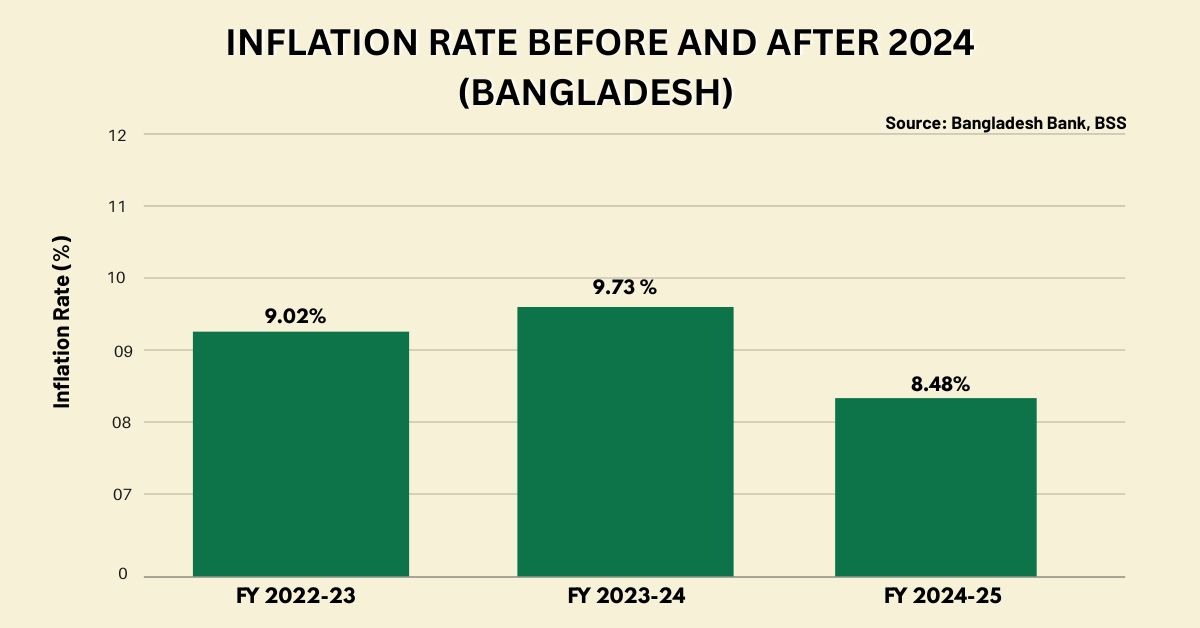
5.2.Foreign Direct Investment (FDI) and Investor Confidence
•Before August 2024: Foreign companies were scared to invest in Bangladesh because of dollar shortages and political unrest. So, FDI was falling.
•After August 2024: After the new government took over, FDI dropped even more to a 6-year low. But as the government started making economic reforms and bringing stability, confidence started to come back. By early 2025, some industries started to get new investments, showing hope for the future.
5.3.Corruption and Clean Governance
•Before August 2024: Corruption was very high. Bangladesh got a very poor score of 23 out of 100 on the Corruption Perception Index (CPI) the worst in 13 years. People were angry and frustrated.
•After August 2024: The new government promised to fight corruption. They took big steps, like closing the tax board and starting investigations against people involved in money crimes. It will take time for the corruption score to improve, but these moves show they are serious about cleaning up the system.
Read more: Dr Mohammad Yunus: An eye of new Bangladesh
5.4.Remittances
•Before August 2024: In FY 2022-23, remittance inflows $21.61 billion, FY 2023-24 (ending June 2024), remittance inflows were $23.91 billion. While this was a decent amount, a significant portion of expatriate earnings was being sent through illegal channels (hundi) due to a large gap between the official and unofficial exchange rates. This meant the country was not receiving the full benefit of its foreign workers’ earnings, contributing to a dollar crisis.
•After August 2024: In the fiscal year 2024-25 (June 2025), Bangladesh saw a big improvement in remittance the money sent by people living and working abroad. After a new government came to power and made some important changes to policies, the country received $30.33 billion in remittances which is the highest amount ever in one year. This was a 26.8% increase compared to the previous year. That means people sent much more money home than before, and it gave a big boost to Bangladesh’s economy.
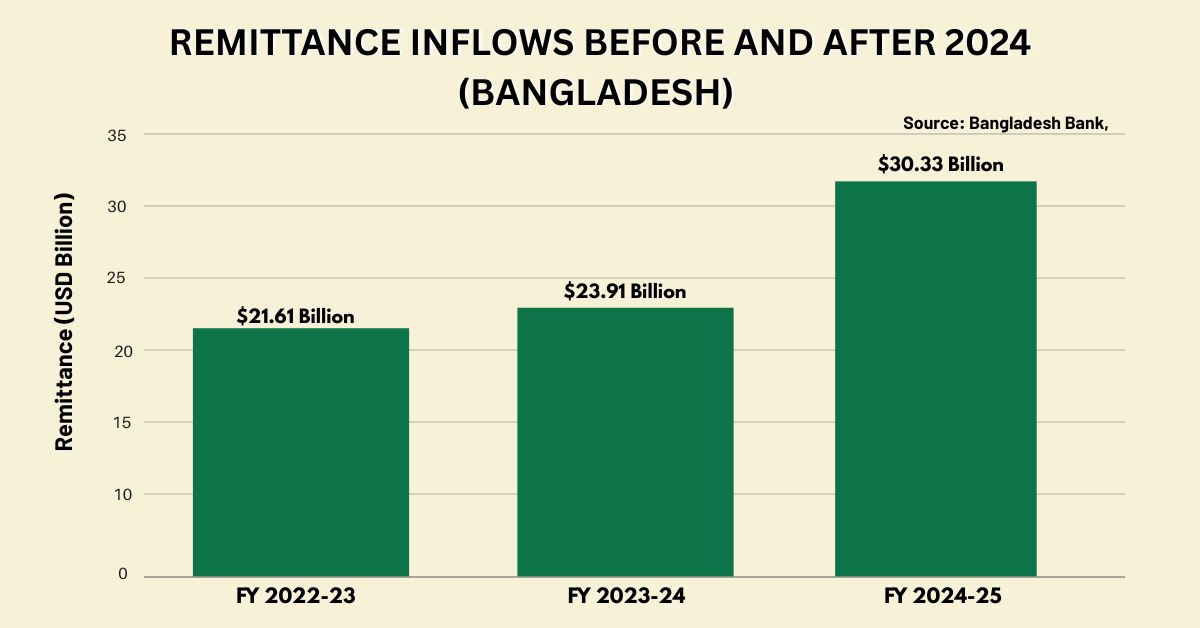
5.5.Foreign Currency Reserves
•Before August 2024: In July 2024, Bangladesh was facing a serious financial problem. The amount of foreign currency the country had saved up, called foreign exchange reserves — was very low. Using the method the IMF (International Monetary Fund) follows to calculate this (called BPM6), Bangladesh had just a little over $20 billion in reserves. Even the total (gross) reserves were not enough, and the country was having trouble paying for important imports like fuel, food, and medicines. This caused a major dollar crisis, meaning there weren’t enough US dollars available in the country, which made international trade and payments very difficult.
•After August 2024: By July 2025, Bangladesh experienced a strong turnaround in its economic situation. This recovery was mainly driven by two key factors,
- A big increase in money sent home by Bangladeshis living abroad
- The government handled the economy more carefully and responsibly
The country’s gross foreign exchange reserves, the total amount of foreign currency held by the central bank, Increase to $30 billion. This figure was based on the central bank’s traditional calculation method and marked a major improvement from the previous year’s crisis level.
Even when measured by the International Monetary Fund’s (IMF) conservative method, known for giving a lower but more accurate picture, net reserves reached nearly $25 billion. This sharp rise showed that Bangladesh had regained a more stable financial footing and was in a better position to handle its international payments and import needs.
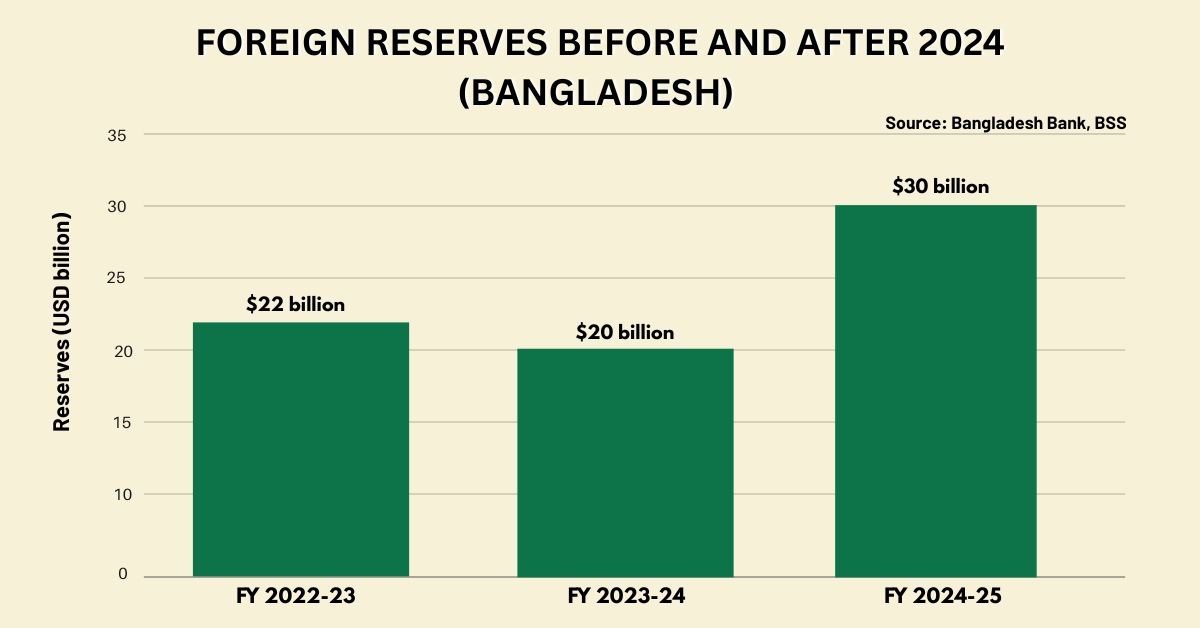
5.6.GDP Growth and Per Capita Income
•Before August 2024: The country’s economic growth was steady but not very fast, staying between 5.6% and 5.8%. This was slower than the high growth seen before the pandemic. Problems like high inflation and a weak currency made growth difficult.
•After August 2024: Economic growth is expected to slow down more, to around 4.2% (Provisional) in the 2024-25 financial year. The main reasons are political problems and uncertainty in the second half of 2024. High interest rates and political instability reduced both consumer spending and business investment, causing a short-term slowdown.
The main parts of the economy stayed the same:
- Services sector (like banking, transport, education) was the biggest.
- Industry (factories, especially clothing exports) came second.
- Agriculture (farming) was the smallest but important though it struggled due to floods.
6.Major Initiatives and Policies by Dr. Yunus
Dr. Muhammad Yunus took over as the head of Bangladesh’s interim government on August 8, 2024. Since taking power he fulfilled several major initiatives and policies. The government’s actions are largely aimed at stabilizing the country’s fragile economy and setting the stage for a free and fair election.
6.1.Subsidies and Tax Collection
Dr. Yunus’s government is trying to collect more taxes in a better way. They removed the old tax authority called the National Board of Revenue (NBR) and made new teams to handle different kinds of taxes. This will help the system work faster and with less corruption. The capital gains tax has been cut to 15%, and they are trying to stop illegal money from leaving the country.
To save money, the government is spending less on subsidies. But they didn’t stop helping poor people but they are still giving food support through Open Market Sale (OMS) and food-friendly programs. They also allowed the dollar rate to change freely, which helps reduce the need for subsidies.
6.2.Easing Business and Bold Reforms
The temporary government has been trying hard to fight corruption because it makes doing business very difficult. They created an independent group to prepare a special report (called a “white paper”) to understand the country’s economic problems especially money being sent out of the country illegally. They also made changes to improve the financial sector as they reorganized the stock markets and removed the leaders of some weak banks. All of this is being done to bring back trust and make it easier and safer for businesses to operate in Bangladesh.
One of the biggest changes made by the government is replacing the NBR (National Board of Revenue), which used to manage tax collection. This is a brave step to completely change how the government collects money from taxes. They also stopped some big development projects that were not very useful to save money. Besides this, they are trying to bring back money that was stolen or hidden illegally. To reduce the pressure on the country’s foreign currency reserves, the government is talking to foreign lenders to change the terms of loans and make them easier to repay.
6.3.Support for SMEs, RMG, and Startups
The government has taken steps to address key sectors of the economy, particularly the ready-made garment (RMG) industry, which is a major employer and exporter. The government has made improving the garment (RMG) sector a top priority. They helped factory owners and workers come to an important 18-point agreement. This included demands like setting a new minimum wage, giving better allowances, and adding bonuses for regular attendance each month. These changes are meant to make workers’ lives better and keep international buyers happy with Bangladesh’s labor standards.
The government hasn’t made many special rules just for startups or small businesses (SMEs), but it is working on big changes to help all businesses. By fighting corruption and fixing problems in the financial sector, the government is trying to make the business environment more stable and fair. These efforts will also help startups and small businesses grow more easily.
6.4.Diaspora-Friendly Steps
The interim government is trying to reconnect with Bangladeshis living abroad (the diaspora) and improve relationships with other countries. Dr. Yunus is well known around the world, and he is using that reputation to bring in trade and investment. He has traveled to countries like the U.S. and China to ask for loans and financial support. The government has also restarted trade talks with countries like Pakistan, which had stopped for many years.
These efforts help build trust with other countries and attract foreign money to Bangladesh. This could benefit Bangladeshis living abroad too. However, special policies just for the diaspora like making it easier for them to invest or giving them extra benefits are still being planned and haven’t been fully implemented yet.
7.Industrial Situation Before and After August 2024
Before August 2024, Bangladesh’s industry was in a crisis. Factories, especially in the vital Ready-Made Garment (RMG) sector, faced shutdowns due to political unrest, a severe dollar shortage, and high inflation. After August 2024, the interim government brought stability, leading to a slow but noticeable recovery driven by new labor reforms and economic stabilization efforts.
7.1.Before August 2024;A Period of Crisis in the Industrial Sector
Before August 2024, Bangladesh’s industrial sector was going through a very difficult time. The Ready-Made Garment (RMG) industry, which is the backbone of the country’s economy, was especially affected. The situation became worse because of political unrest. There were large student protests and strikes, which made it difficult for factories to operate. Many had to shut down temporarily, and some permanently. As a result, production stopped, and factories lost a lot of money.
At the same time, the country was facing a serious dollar crisis. Factories couldn’t get the foreign currency (US dollars) they needed to buy raw materials like cotton, fabric, and dyes from other countries. On top of that, the Bangladeshi Taka was weak, and inflation was very high, which made everything more expensive. This raised the cost of production, meaning it was too expensive for factories to make goods and sell them abroad. Because of this, foreign buyers were no longer interested, and Bangladesh’s exports declined.
Due to all these problems, hundreds of factories closed, and many workers lost their jobs especially women, who make up a large part of the RMG workforce. This caused not only economic problems but also a humanitarian crisis, as families were suddenly without income or support.
7.2.After August 2024; A Slow but Hopeful Recovery
In August 2024, a new interim government took over and immediately focused on fixing the damaged economy. Their first priority was to bring back law and order. The protests were calmed, the streets became safer, and as a result, factories began to reopen. Workers returned to their jobs, and production slowly started again.
The government also worked hard to improve the business environment. They took steps to fight corruption and create a system where businesses could feel safer and more confident. This helped restore investor trust, both locally and internationally.
They are continuously trying to solve problems but from the first of interim government they focus on some parts which are most important for country’s sake, those are-
•Labor Reforms; Fixing the Problems Between Workers and Owners
One of the most important changes made by the new government was helping factory owners and workers come to an agreement. They created a new 18-point labor deal that addressed serious problems like low wages, unsafe working conditions, and job insecurity. These issues had caused major protests in the past. The agreement helped calm tensions, and now workers and owners could work together more peacefully, which made the whole industry function better.
•Solving the Dollar Crisis; Making Trade Easier Again
The dollar crisis that hurt factories so badly earlier also began to improve. The government worked to stabilize the value of the Bangladeshi currency and increase foreign currency reserves (the money the country holds in dollars and other global currencies). This made it easier for factories to import the materials they needed, like cotton and machinery. The supply chain the system that moves goods from production to delivery started working again, and this was a huge step in helping the industry recover.
•Industrial Growth; Still Slow but Part of a Bigger Plan
Even though things were getting better, the overall industrial growth remained low. For the fiscal year 2024–25, growth was only 3.97%, which is quite slow. But experts say this was expected, as the country was still recovering from serious problems. The slow pace is considered part of a broader plan to stabilize the economy before aiming for fast growth again.
•Ready-Made Garment (RMG)
The RMG sector, which includes factories that make clothes for export, became the strongest part of the recovery. Even though it had been hit hard before August 2024, it bounced back quickly. In fact, RMG exports grew by 8.84%, earning the country more than $39 billion. With the new labor agreement and better business conditions, the RMG sector became the main engine of recovery for Bangladesh’s economy.
•Textile Sector
The textile sector, which produces materials like yarn and fabric for the garment industry, was also affected earlier by the dollar shortage. Since it depends heavily on the RMG industry, its recovery also started as RMG bounced back. As long as garment exports continue to grow, the textile industry will also keep improving.
•Pharmaceuticals
Unlike other industries, the pharmaceutical sector was not directly affected by the protests or dollar crisis. This sector produces generic medicines and provides for almost all of Bangladesh’s medical needs. Although it didn’t suffer much, it still benefited from the stable currency and better business policies introduced by the new government. It continues to be a promising and growing industry.
•Other Smaller Industries
Other important industries like shipbuilding, light engineering, and food processing also began to improve. These sectors are smaller than garments or pharma but play a key role in creating jobs and supporting local economies. As the overall situation in the country became more stable, these industries also started to grow, slowly but surely.
8.Public Perception & Criticisms
After Dr. Yunus took over as head of Bangladesh’s interim government in August 2024, the initial public hopeful and support have been tested by several challenges and criticisms. While many people remain hopeful, there is growing impatience and frustration with the pace of change.
8.1.Why People First Liked Dr. Yunus’s Government
When Dr. Muhammad Yunus became the head of the interim government in August 2024, most people felt very hopeful. They believed he could fix the problems in politics and the economy because he was seen as an honest and respected person. There were three big reasons for this support:
-
Honest Image: Dr. Yunus is a Nobel Peace Prize winner and not part of any political party. People trusted him because he wasn’t involved in the past political fighting or corruption.
-
Hope for Change: The new government promised to fix the broken systems, like government offices and courts and make elections fair for everyone. Many people, especially young students who had demanded change, were excited about these promises.
-
Better Economy at First: At the start, the government took steps that helped improve the economy a little. Foreign money reserves increased, and inflation (price rises) started to go down. This made people feel a bit more comfortable compared to the crisis before.
8.2.Why People Started Getting Frustrated
As time went on, people started becoming disappointed because progress was slow and problems remained. There are a few main reasons for this criticism:
•Delay in Election and No Clear Plan: People want to know when the next election will be held. The government said it would happen sometime between late 2025 and mid-2026, but didn’t give an exact date. This made people especially the opposition party BNP upset. They feel like the government is taking too long and not doing reforms quickly enough. Because of this, there’s political confusion and unrest.
•Law and Order Still a Problem: Although the government wants to improve things, crime is still happening and many think the police and government officers are not being properly controlled. Some feel that the old corrupt officials are not being punished fast enough. At the same time, others are worried that the government is arresting people for political reasons.
•Internal Tensions and Inexperience: The people running the interim government are advisors smart and honest, but most of them don’t have experience running a country. Because of this, decisions are taking too long and sometimes seem unorganized. Also, there are reports that the civilian leaders and the army are not always getting along. Some political parties and government workers are also not cooperating, which makes things worse.
•Controversial Words and Decisions: Dr. Yunus has said some things that upset people like when he mentioned a “reset button” for Bangladesh’s history. Some people didn’t like that. Also, the government decided to remove the word “Adibashi” (meaning indigenous people) from textbooks, which made many indigenous groups feel disrespected. These actions caused public arguments and made some people lose trust.
9.Challenges Remaining and Outlook
The interim government Dr. Yunus has made some good progress, but there are still many serious problems. These problems could affect the future of Bangladesh whether the country becomes more stable and democratic or falls back into trouble.
9.1.Political and Social Challenges
•Uncertainty About the Election: Many people are worried because the date for the next election is not soon. The government says it will happen in February 2026, but some political parties and people want it to happen earlier. They fear that waiting too long may give the interim government too much time in power, which can hurt democracy.
•Justice and Punishment for the Corrupt: People who supported the student movement wanted those involved in corruption and human rights abuse to be punished. Although the government has started doing something about it, many feel it’s moving too slowly. Also, some people think the arrests may be politically biased targeting specific people unfairly.
•Weak Governance and Law Problems: The people in this interim government are not experienced in running a country. Because of this, the government is finding it hard to manage things properly. There are more crimes happening, mobs taking the law into their own hands, and the bureaucracy (government workers) is not working efficiently. This raises doubts about whether the government can maintain law and order.
•Threat to Religious Harmony: There have been reports of attacks on religious minority groups (like Hindus or Christians), which is making people afraid that the country’s peaceful religious balance is breaking. Radical Islamist groups are becoming more active in politics, which is dangerous for Bangladesh’s tradition of being a secular (non-religious-based) country.
9.2.Economic Challenges
•High Prices and Unemployment: Even though inflation (price rise) is going down a little, things are still very expensive. This is especially hard for poor and middle-class people. Also, many young people don’t have jobs even though they have education, there are not enough good jobs for them.
•Public Services Are Weak: The government is being criticized for not creating enough jobs and not taking care of the needs of workers and farmers. The power sector (electricity), where people are facing frequent load-shedding (power cuts) and bad service is the big example.
•Problems in the Banking Sector: The banking system is still in bad shape. Many banks have too many bad loans (loans that people are not repaying). The government has made a new law to give the central bank more control to fix this, but actually fixing the problem will take a lot of time and effort.
9.3.Outlook for the Future
The future of Bangladesh depends on what the government and political leaders do next. There are three major things that need to happen:
•Hold a Fair and Timely Election: The most important thing is to have a free and fair election. If this doesn’t happen soon and in a proper way, the country could face more political trouble and social problems.
•Real and Strong Reforms: The government must do more than just talk, it needs to actually fix problems like corruption, improve government offices, ensure justice, and help people live better lives.
•Work Together with All Political Groups: For long-term peace and progress, the government must sit and talk with all political parties and groups. Everyone should agree on how to move forward. If they don’t, the country could go back to political fighting and instability.
10. Conclusion
From August 2024 to August 2025, Bangladesh has gone through major changes under the interim government. With strong efforts to reduce corruption, stabilize the economy, and build trust among foreign investors, the country has shown signs of recovery. The rise in FDI during early 2025 and reforms in financial institutions are early signs of progress. Though challenges still exist like inflation, unemployment, and political uncertainty. Bangladesh is slowly moving in the right direction. If these reforms continue and political stability is maintained, the country could see even stronger economic growth and global confidence in the coming years.
The interim government had to deal with a very weak economy. Prices were very high, the country was running out of dollars, and foreign exchange reserves were very low. But the government quickly took action, stopping illegal money transfers and making the currency more stable. As a result, money sent by Bangladeshis living abroad (remittances) increased a lot, and exports grew too. These changes helped rebuild the country’s reserves and lower inflation to the lowest level in two years. The garment industry, which is very important for the economy, also started to recover.
But even though the economy improved, there were many problems in politics and society. At first, people supported the new government. But now, many are disappointed because there is no clear plan about the country’s future. The biggest concern is not knowing when the next election will happen. People are getting frustrated. The government is trying to reduce corruption and improve institutions, but the progress is slow. Also, law and order have become worse in some areas, and some crimes have increased. People who were hoping for big changes are now losing hope.
It still needs to prove that it can ensure a fair election, fix institutions, and keep peace in society. Its true success will be judged by how well it can build a strong and fair future for Bangladesh not just by fixing the economy, but also by creating a stable and democratic country.
Reference
Wikipedia
Al Jazeera
SOAS
The Business Standard
World Bank
DW
Amnesty International
UN
The Bangladesh Express
International Crisis Group
ICTJ
www.usip.org
Human Rights Watch
The Guardian
The Daily Star
The Financial Express
BTI 2024
BBS
CPD
Dhaka Tribune
Xinhua
bdnews24.com
Daily Observer
Prothom Alo
The Hindu
Share via:

